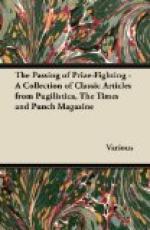* * * * *
Sir THEODORE COOK has already done sound work in dealing with German methods, and in The Mark of the Beast (MURRAY) he pursues his labours a step further. So careful is he to give incontestable proofs for the charges he brings against the Huns that even the most anaemic neutrals must find a difficulty in reading this volume without recognising the truth. Especially he emphasizes the dangers of peace-making with an enemy whose whole policy and programme have been based on lies. And if he insists many times and again upon this point he has his excuse in the fact that some of us are so extraordinarily forgetful and forgiving that we cannot be reminded too often of what the future has in store for us if we do not now remember the past. With such an absolutely flawless case in his hands I find myself wishing sometimes that Sir THEODORE had been less prodigal of the denunciatory language which he hurls at Teutonic heads. Not for a moment would I suggest that the Hun does not deserve vituperation, but I am inclined to think that a less violent manner of attack is more effective. In his own way, however, Sir THEODORE is inimitable, and I can pay no higher praise to his book than to say that I know of no War-literature so admirably calculated to make BETHMANN-HOLLWEG ("more double than his name”) really sorry for himself.
The War has not been lacking in fine memorials of the dead. To what extent the Germans have commemorated the fallen I have no notion; but in France and Italy the papers constantly print tender and eloquent tributes, usually to the young. And in England we have the same thing too, touchingly, proudly and generously done. For the most part such tributes are mere records, but now and then they reconstruct; and the most remarkable example of such reconstruction—to the world at large, absolute creation—is the memoir of Charles Lister (UNWIN), which his father, Lord RIBBLESDALE, and some devoted friends have, with perfect biographical tact, prepared. But for CHARLES LISTER’S untimely death, leading his men against the Turks in July, 1915, most of the letters in this book would never have been printed at all; for whatever his career might have become—and he was a man apart and bound for distinction—and however great a record were his, the early years could not be thus liberally illumined. But since death decreed that these early years—he was not quite twenty-eight when he was wounded for the third




